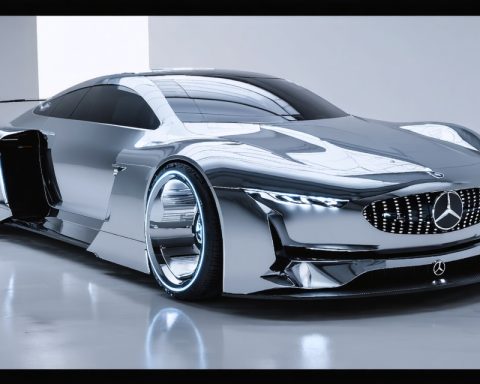- Hydrogen energy is at the forefront of a global transformation aiming to reduce reliance on fossil fuels and promote cleaner energy.
- As the most abundant element, hydrogen offers an almost limitless supply, primarily derived from water, and powers fuel cells that emit only water vapor and heat.
- Cities like Tokyo and Paris are adopting hydrogen-powered public transportation, significantly reducing their carbon footprints.
- Industries and startups are embracing hydrogen technology to improve energy efficiency and provide power in remote locations and disaster zones.
- Global investments in research and green hydrogen infrastructure are driving this revolution, with countries creating hydrogen highways and hubs.
- The hydrogen movement represents a broader shift towards sustainable growth and cleaner air for future generations.
A seismic shift is sweeping across the globe, sparking a revolution that promises to transform how we fuel our world. In the heart of this upheaval lies hydrogen—a simple element with the extraordinary potential to power a cleaner future. Hold onto your hat as we delve into the emerging hydrogen revolution, set to reshape industries and upend our reliance on fossil fuels.
Hydrogen’s appeal is as clear as water, which, incidentally, is its primary source. As the most abundant element in the universe, hydrogen offers an almost limitless energy supply. From bustling cityscapes to winding country roads, hydrogen fuel cells promise to power diverse landscapes. These cells convert hydrogen into electricity, releasing only water vapor and heat. Say goodbye to polluting emissions and hello to a breathable tomorrow.
Picture sleek buses zipping through city streets, their only trail a faint mist—a vision becoming reality in cities like Tokyo and Paris, where hydrogen-powered public transport is reducing carbon footprints. Imagine factories humming with efficiency, powered by hydrogen, unshackling industrial giants from the yoke of fossil fuels. The revolution is here, palpable and electric.
But it’s not just the big players gearing up. Small startups, with tenacity and innovation, are harnessing hydrogen technology, converting dreams into practical solutions. Imagine portable hydrogen units providing power where it’s most needed, from disaster zones to remote villages, bridging the energy divide.
So, what powers this revolution? Innovation surges forward, propelled by investments in research and infrastructure. Nations are aligning, creating hydrogen highways and hubs, a testament to collective ambition. Governments worldwide, from the EU to Australia, invest billions in green hydrogen projects, bolstering domestic industries while cutting emissions.
The takeaway? This isn’t just an energy transition; it’s a global movement promising to create sustainable growth and cleaner air. As we stand at the brink of this hydrogen-fueled world, the question arises: are we ready to embrace this revolution, to reimagine our future built not on the ashes of fossils but on clean, renewable energy?
Leap headlong into the hydrogen era. The revolution is now. Every step toward hydrogen brings us closer to a planet where innovation and sustainability harmonize, whispering promises of a brighter, cleaner world. Will you join the revolution?
Hydrogen: The Game-Changer in Global Energy Dynamics
Expanding the Hydrogen Revolution
The narrative of the hydrogen revolution is one of innovation, global collaboration, and a quest for cleaner energy. But to truly grasp the scale and potential of this transformation, we must delve deeper into the underlying technologies, market potential, and real-world applications that are propelling this movement forward.
Key Innovations in Hydrogen Technology
– Electrolyzers: At the core of producing green hydrogen is the electrolyzer, a device that splits water into hydrogen and oxygen using electricity. Innovations in electrolyzer efficiency and cost are pivotal. According to the International Energy Agency (IEA), the cost of electrolyzers is projected to decline by about 60% by 2030, making green hydrogen more competitive with incumbent energy sources.
– Fuel Cell Advancements: Fuel cell technology, which converts hydrogen into electricity, has seen advances in durability and efficiency. Companies like Ballard Power Systems and Plug Power are at the forefront of developing high-performance fuel cells that are being used in everything from trucks to trains.
Market Forecasts & Industry Trends
– Growing Investments: The global hydrogen market is poised for explosive growth, with forecasts suggesting it could reach $700 billion by 2050 ([source](https://www.iea.org)). This is driven by policy support and technological advancements.
– Hydrogen Infrastructure: The development of hydrogen refueling stations is critical. Countries like Japan and Germany are leading the way, with extensive plans to expand their hydrogen networks.
Real-World Applications
– Transportation: Besides public transport, companies like Toyota and Hyundai are producing hydrogen-powered vehicles, while aviation giants like Airbus are developing hydrogen propulsion systems for aircraft.
– Industrial Applications: Heavy industries, such as steel and cement, are significant carbon emitters. Projects like the Hybrit initiative in Sweden are pioneering hydrogen use in steel production, potentially reducing emissions by over 90%.
Challenges & Limitations
– Current Production Methods: Most hydrogen is currently produced from natural gas, which still results in carbon emissions. Transitioning to green hydrogen, produced from renewable electricity, is crucial.
– High Costs: Despite expected cost reductions, the high cost of hydrogen production and storage remains a barrier to widespread adoption.
Insider Perspectives & Expert Opinions
Energy experts are optimistic but cautious about the hydrogen future. They emphasize the need for coordinated policy measures and the importance of scaling up infrastructure and production capabilities.
Pros & Cons Overview
Pros:
– Zero emissions when using green hydrogen.
– Diversifies energy sources and enhances energy security.
– Potential to decarbonize hard-to-abate sectors.
Cons:
– Current reliance on fossil fuels for production.
– Infrastructure development is capital-intensive.
– Competitive pressure from battery-electric solutions in some applications.
Actionable Recommendations
1. Investment in R&D: Support research into improving hydrogen production and storage technologies.
2. Policy Advocacy: Engage with policymakers to accelerate the development of hydrogen infrastructure and incentives.
3. Sustainability Practices: Businesses should integrate hydrogen as part of their sustainability roadmaps, especially in logistics and supply chain applications.
Conclusion
The hydrogen revolution holds the promise of a sustainable energy future. By unraveling technological challenges and fostering strategic collaborations, we can accelerate this clean energy shift. Are you ready to be part of this change? Join the conversation and explore ways to integrate hydrogen solutions into everyday life.
Keep an eye on evolving trends and innovations within the hydrogen sector to stay informed. Visit the International Energy Agency for more insights into the global hydrogen agenda.
















